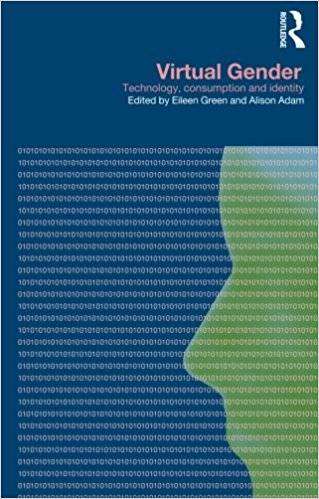Virtual Gender : Technology Consumption and Identity Matters
- Unit price
- / per
-
Author:GREEN Eileen / ADAM Alison
-
ISBN:9780415233156
-
Publication Date:March 2001
-
Edition:1
-
Pages:352
-
Binding:Paperback
-
Publisher:Routledge
-
Country of Publication:United Kingdom


A Back Order button means that we don’t have the book in stock at our store. It may already be on order – or we can order it for you from a publisher or distributor at no additional cost.
As we source items from around the globe, a back-order can take anywhere from 5 days to several weeks to arrive, depending on the title.
To check how long this might take, you’re welcome to contact us and we can provide an ETA or any other information you need. We recommend checking the timeframe before committing to an online order.
Virtual Gender : Technology Consumption and Identity Matters
- Unit price
- / per
-
Author:GREEN Eileen / ADAM Alison
-
ISBN:9780415233156
-
Publication Date:March 2001
-
Edition:1
-
Pages:352
-
Binding:Paperback
-
Publisher:Routledge
-
Country of Publication:United Kingdom
Description
As yet, there has been relatively little published on women's activities in relation to new digital technologies. Virtual Gender brings together theoretical perspectives from feminist theory, the sociology of technology and gender studies with well designed empirical studies to throw new light on the impact of ICTs on contemporary social life.
A line-up of authors from around the world looks at the gender and technology issues related to leisure, pleasure and consumption, identity and self. Their research is set against a backcloth of renewed interest in citizenship and ethics and how these concepts are recreated in an on-line situation, particularly in local settings.
With chapters on subjects ranging from gender-switching on-line, computer games, and cyberstalking to the use of the domestic telephone, this stimulating collection challenges the stereotype of woman as a passive victim of technology. It offers new ways of looking at the many dimensions in which ICTs can be said to be gendered and will be a rich resource for students and teachers in this expanding field of study.
Adding product to your cart
You may also like
A Back Order button means that we don’t have the book in stock at our store. It may already be on order – or we can order it for you from a publisher or distributor at no additional cost.
As we source items from around the globe, a back-order can take anywhere from 5 days to several weeks to arrive, depending on the title.
To check how long this might take, you’re welcome to contact us and we can provide an ETA or any other information you need. We recommend checking the timeframe before committing to an online order.
You may also like
You may also like
-
As yet, there has been relatively little published on women's activities in relation to new digital technologies. Virtual Gender brings together theoretical perspectives from feminist theory, the sociology of technology and gender studies with well designed empirical studies to throw new light on the impact of ICTs on contemporary social life.
A line-up of authors from around the world looks at the gender and technology issues related to leisure, pleasure and consumption, identity and self. Their research is set against a backcloth of renewed interest in citizenship and ethics and how these concepts are recreated in an on-line situation, particularly in local settings.
With chapters on subjects ranging from gender-switching on-line, computer games, and cyberstalking to the use of the domestic telephone, this stimulating collection challenges the stereotype of woman as a passive victim of technology. It offers new ways of looking at the many dimensions in which ICTs can be said to be gendered and will be a rich resource for students and teachers in this expanding field of study.
-
-
Author: GREEN Eileen / ADAM AlisonISBN: 9780415233156Publication Date: March 2001Edition: 1Pages: 352Binding: PaperbackPublisher: RoutledgeCountry of Publication: United Kingdom
As yet, there has been relatively little published on women's activities in relation to new digital technologies. Virtual Gender brings together theoretical perspectives from feminist theory, the sociology of technology and gender studies with well designed empirical studies to throw new light on the impact of ICTs on contemporary social life.
A line-up of authors from around the world looks at the gender and technology issues related to leisure, pleasure and consumption, identity and self. Their research is set against a backcloth of renewed interest in citizenship and ethics and how these concepts are recreated in an on-line situation, particularly in local settings.
With chapters on subjects ranging from gender-switching on-line, computer games, and cyberstalking to the use of the domestic telephone, this stimulating collection challenges the stereotype of woman as a passive victim of technology. It offers new ways of looking at the many dimensions in which ICTs can be said to be gendered and will be a rich resource for students and teachers in this expanding field of study.
-
Author: GREEN Eileen / ADAM AlisonISBN: 9780415233156Publication Date: March 2001Edition: 1Pages: 352Binding: PaperbackPublisher: RoutledgeCountry of Publication: United Kingdom
-



